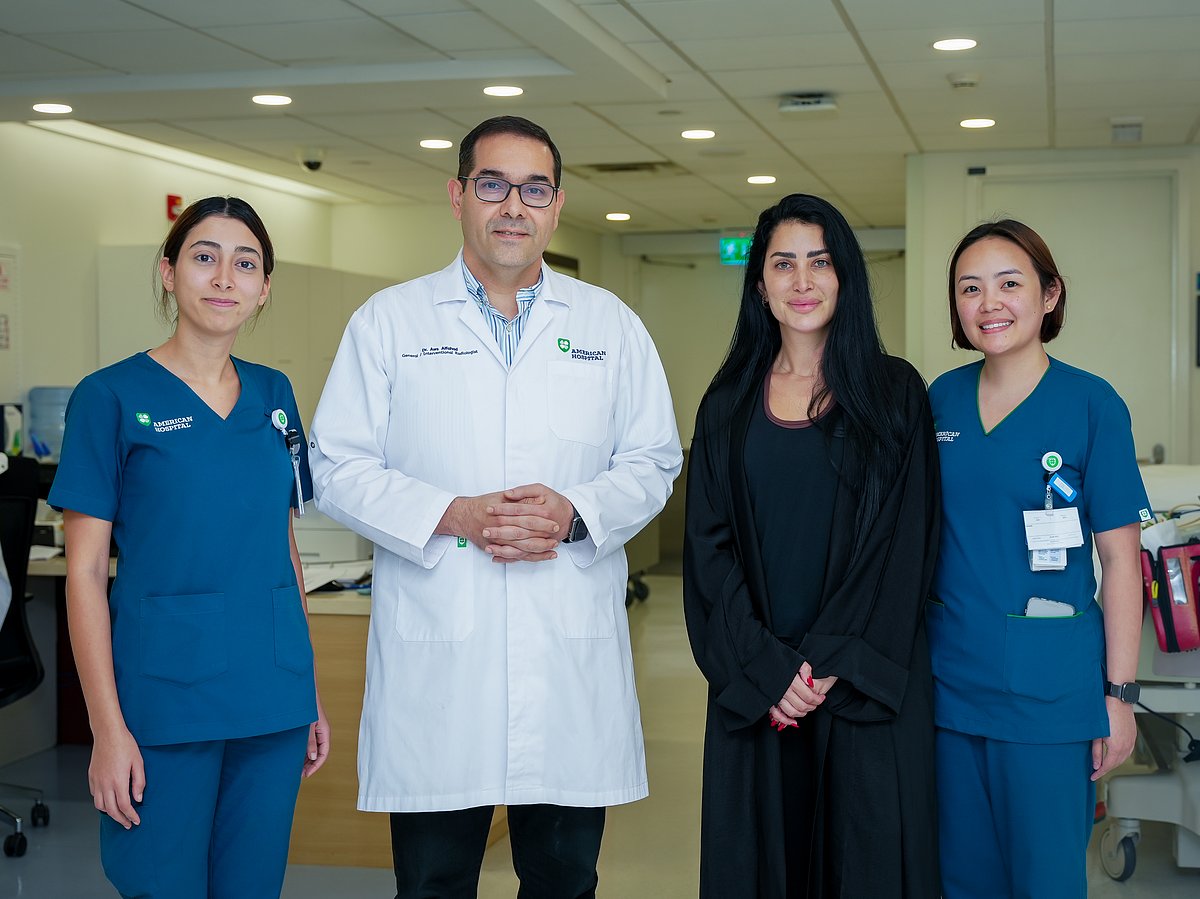American Hospital Dubai successfully performs a complex thyroid nodule microwave ablation
The nodule’s location made the procedure tough, needing ultra-precise skills

Three years ago, Nisrine Saad, 38, discovered a 4-cm nodule on her thyroid. She consulted Dr. Aws Sarmed Alfahad, a senior interventionist at American Hospital Dubai. Fortunately, it was benign, but it still required monitoring.
Thyroid nodules are common and can arise from various factors, including colloid accumulation (a benign buildup of thyroid cells), thyroid cysts, hyperplastic or adenomatous nodules (tumors formed by an unusual increase in thyroid tissue), and neoplasms (abnormal cell masses). These nodules are often detected incidentally through imaging, and studies suggest that up to 50–60 per cent of adults may have at least one thyroid nodule detectable by ultrasound.
Most thyroid nodules are benign and do not require surgical intervention, with approximately 5–10% being malignant. However, this female patient’s case was particularly challenging because the nodule was in the posterior region of the left thyroid lobe, which was pressing on the recurrent laryngeal nerve (RLN). (The RLN provides nerve function for the larynx and throat muscles, which control swallowing, breathing, and vocal cord movement.)
Microwave Ablation: Opening New Frontiers of Precision
Dr. Aws and his team decided to perform microwave ablation on the nodule. This procedure involves generating heat within the structure to destroy cells via a probe through the skin. The heat ‘burns’ up the nodule, reducing its size.
However, the nodule’s proximity to critical structures, like the recurrent laryngeal nerve, trachea, and esophagus, heightens the risk of thermal injury or burn caused by the energy generated by microwaves on surrounding structures.
What made the procedure noteworthy was the technical complexity of the microwave ablation due to the nodule's location and the excellent cosmetic and functional outcome without surgery. “It meant ultra-precise targeting in small glands with limited working space,” said Dr Aws. Lack of precision, he said, could lead to nodule regrowth due to incomplete ablation margins. He added that imprecise ablation may also lead to post-ablation fibrosis, making follow-up evaluation challenging.
“It requires experience, real-time ultrasound guidance, and hydrodissection techniques to mitigate these risks,” said Dr Aws. Hydrodissection uses a directed jet of water to surgically separate tissues, creating a thermal barrier that protects adjacent structures and allows for safe and complete ablation.
Dr Aws explained that the microwave ablation procedure of a thyroid nodule typically takes 15 to 30 minutes, based on the lesion's size, location, and complexity. “Preparation and post-procedural observation can extend the session to about 1–2 hours.”
The success of this complex procedure once again demonstrates American Hospital Dubai’s leadership in minimally invasive techniques by adopting microwave ablation as an alternative to thyroidectomy for benign nodules, said Dr Aws.
Dr Aws and his team’s world-class expertise meant the patient experienced minimal discomfort and no vocal changes, and she returned to daily activities within 24 hours. “Follow-up imaging at one month showed expected nodule shrinkage with no residual vascularity,” said Dr Aws.
American Hospital Dubai: Reinforcing regional leadership in minimally invasive treatments
This case exemplifies American Hospital Dubai’s commitment to cutting-edge, patient-centred care. The hospital’s Interventional Radiology team empowers patients with safe, effective, and scar-free treatments that reduce recovery time and preserve thyroid function without general anesthesia or hospital admission by offering advanced options like microwave ablation.
“Our success in such cases reinforces American Hospital Dubai’s regional leadership in image-guided, minimally invasive therapies,” said Dr. Aws.
Nisrine expressed her complete satisfaction and happiness with her treatment and recovery. “I was fortunate to be under the care of Dr. Aws. At first, the thought of undergoing microwave ablation was intimidating, but looking back, it was the best decision I could have made!”
“The procedure was incredibly easy, quick, and painless. My recovery was smooth — I returned to my normal activities within two days. My blood test showed normal TSH levels two weeks later, confirming everything was on track. For anyone considering laser ablation, I highly recommend it. The sooner, the better,” said Nisrine.
Sign up for the Daily Briefing
Get the latest news and updates straight to your inbox
Network Links
GN StoreDownload our app
© Al Nisr Publishing LLC 2026. All rights reserved.